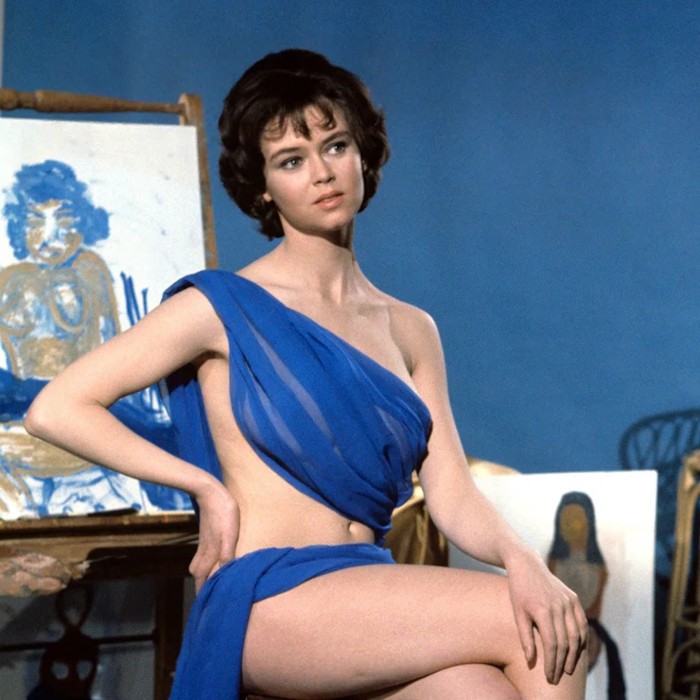
Above, a 1972 photograph of the delightful Miss Gabrielle Drake now the widow, Mrs Louis de Wet taken from the X rated movie, “Au Pair Girls”.
Au Pair Girls was released to British Cinemas in September 1972 (https://en.wikipedia.org/wiki/Au_Pair_Girls).
At the end of September 1972 the film was screened at the ABC Cinema on Lime Street, Liverpool. I was seventeen at the time which meant that I was one year younger than the legal minimum age required to view the film. Not only that at the time I had a problem that many teenage lads have when they reach their majority (18) – they may be 18 but they don’t look 18! At 17 I did not look 17. Thus I would have had difficulties buying a ticket and gaining entry. However, this little local difficulty was solved as I was a student at Riversdale College of Technology at the time and went with a group of other students (we were all Merchant Navy cadets) some of whom were over 18 and looked over 18. This resulted in a couple of chaps buying a couple of tickets and going in whilst we youngsters wandered down to the side of the building standing outside one of the fire exits (that could only be opened on the inside). When the lights dimmed one lad went to that fire escape and let we youngsters in – without paying! We youngsters compensated the two lads by each of us buying a packet of cigarettes (I bought a packet of twenty Woodbines [high tar – non filter tipped] as 20 “fags” was the required minimum).
We all smoked at least one “fag” to make out that we were all adults!
Thus it was that I got round the age restriction and was able to view the delightful Miss Drake sans clothing!
For those interested, the film is available for viewing on Amazon Prime Video in the UK. This of course requires becoming a customer of same.
Notwithstanding the fact that underage lads were able to get past the barriers and to view a film that the law had proscribed the viewing of, there were at least barriers in place which required a degree of underhand behaviour to circumvent.
There are it seems few barriers on the internet and what is known as “social media” that prevent minors from accessing inappropriate content. In addition, many people who access “social media” are subjected to communications that can be abusive, bullying, obscene and threatening. When minors receive such communications it becomes that much more serious.
Supposedly, it was to deal with these problems the UK Parliament passed the controversial Online Safety Act of which the late Brianna Ghey’s mother, Ms Esther Ghey says does not go far enough (https://www.bbc.co.uk/news/uk-68300969).
This of course is an international problem as the internet and “social media” has worldwide access/coverage. This presents a major problem: effective regulation requires an international treaty and with so many countries with so many differencing views getting something agreed is well nigh impossible.
Insofar as the UK is concerned, some of these problems could be addressed by ensuring that UK internet users have to cease being anonymous insofar as the internet and social media use is concerned and that access to “adult material” and “adult websites” is restricted via an age validation procedure: that a person must apply to their internet service provider for an access key/code which only they can use. Clearly, we will have any cases of parents finding themselves in difficulty with the authorities should their children gain access to this key/code. The result will of course be the loss of internet service.
The above would require a lot of work on the part of internet service providers. Work that would require investment and would have to be recouped by increased charges to their customers. I would suggest that those wishing to gain access to “adult material” and “adult websites” ought to be charged specifically for this as I do not think it reasonable that those who do not wish to access this material should be asked to contribute to the cost of same.
Furthermore, I think that such “adult material” and “adult websites” ought to be regulated and that should be degrees of access – inasmuch as those persons wishing to view “extreme content” would have to seek specific access to such which would of course mean that the internet service providers would be aware of their customers predilections. Furthermore, the police should be allowed access to the user data to assist with criminal enquiries.
The one type of material that should not be subject to censorship and age restriction should be current affairs, news and political websites and “social media”.
The simple FACT of the matter is this: If faced with the certainty of being caught, potential offenders do not offend!
